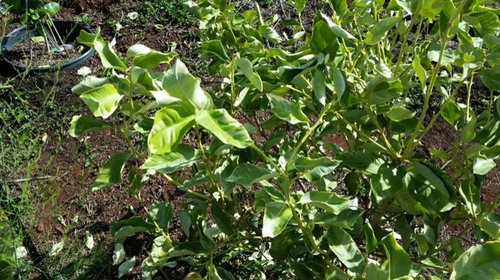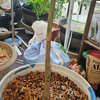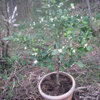Hi, Please, I need some help!
I planted my Variegated Eureka lemon tree about 20 months ago. Purchased it from bigbox HD. It was is in a 3 gal pot and about 2 feet high. Its now, about 5 feet tall, and been bearing fruits continuously.
About a week ago, I noticed that my tree was starting to shed some leaves. A few days ago, I noticed that the leaf shedding had significantly worsened (see attached pics). I fear that the tree may die, if I don't do anything.
It's been an abnormally hot summer here in HI (low 90's for several weeks), and I've been diligently watering all my citrus trees (about 40) on a bi-weekly schedule. So, I don't believe it's a lack of watering issue.
I've checked the leaves and branches, but could not find visible signs of any pests. The only thing I've noticed, is the somewhat abnormal curling of the leaves. But, I believe this could be caused by too much watering, so should not result in causing the tree to shed it's leaves?
I've posted some pictures of the lemon tree, along with adjacent Honey and Owari Satsuma mandarin trees for visual comparison. Note, that the adjacent trees appear perfectly healthy, with no similar shedding problem.
Previously, I've had problems with ground termites attacking some other shrubs growing in my yard. I hope this is not what's happening to my Variegated lemon tree. Anyone experienced any termite problems with citrus trees?
Any advise would be greatly appreciated.
Mahalo, Barry
I had to edit this message several times. I don't seem to be able to get multiple pictures on one message.
Here is a link that might be useful: {{gwi:636955}}
This post was edited by GadgetVictim on Sun, Oct 12, 14 at 18:31











gadgetvictimOriginal Author
johnmerr
Related Professionals
Comstock Park Landscape Architects & Landscape Designers · Parole Landscape Architects & Landscape Designers · Pelham Landscape Contractors · Williamsburg Landscape Contractors · Bell Gardens Landscape Contractors · Brooklyn Park Landscape Contractors · Edwardsville Landscape Contractors · Eustis Landscape Contractors · Fairhope Landscape Contractors · Methuen Landscape Contractors · Waipahu Landscape Contractors · Wilsonville Landscape Contractors · Winchester Landscape Contractors · Shenandoah Landscape Contractors · Palos Heights Landscape ContractorsgadgetvictimOriginal Author
johnmerr
gadgetvictimOriginal Author
johnmerr
gadgetvictimOriginal Author
johnmerr
evdesert 9B Indio, CA
gregbradley
gadgetvictimOriginal Author
johnmerr
Embothrium
gadgetvictimOriginal Author
gregbradley
johnmerr
gadgetvictimOriginal Author
johnmerr
uncle molewacker z9b Danville CA (E.SF Bay)
gadgetvictimOriginal Author